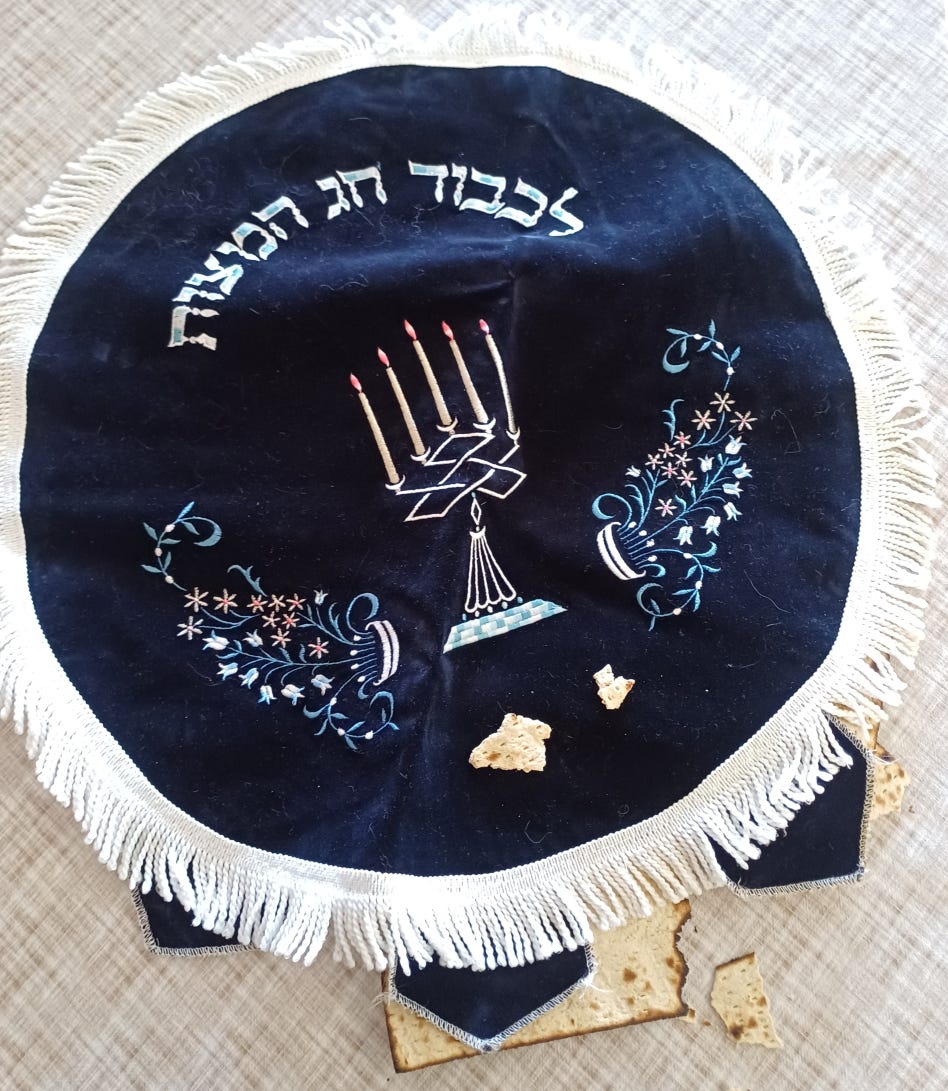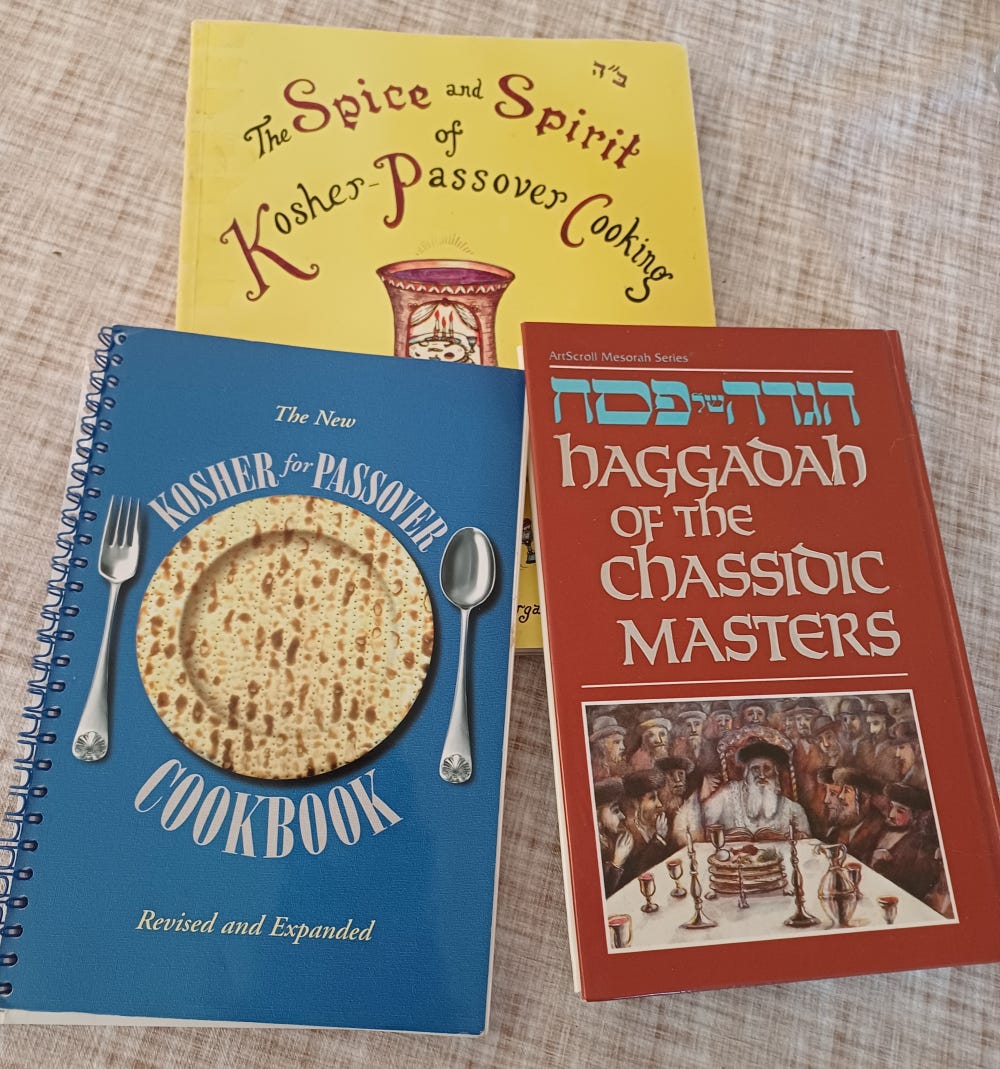Slavery to Freedom, Sadness to Joy
Celebrating can be bitter-sweet, with an emphasis on the sweet. An original Passover story of blending families. For children 10-14. With a recipe.
Hey Tamar,
How was your seder? Mine was... I guess you would say interesting. You know I worried about it.
I keep thinking about the video at Imma's wedding to Shai. I already wrote you about the video, but here it is again, in case you forgot. There were lots of pictures of Shai and his kids with his first wife, their mother. She was so skinny and pale before she died! Then the pictures of my family. The last pictures of my Abba on October 8 made me cry. He was in his uniform, ready to go and fight for our country. He never came back.
We all know sadness. Now we're supposed to become one big, happy family.
When Imma told us she was getting married again she said, "It's a a year and a half. It's time to move on." She and Shai look really happy now. So do all the little kids. His are already calling my mother Imma, and my little sister is calling Shai Abba. Our families have spent a lot of time together. I still was feeling really weird about being one big, happy family, though.
So, the seder. We were almost 30 people. A bunch of tables were pushed together in a big square. Imma and me and my brother and sister were there, of course. Everyone else was from Shai's family. By "everyone" I mean everyone. Not just Shai's kids. His parents, brothers, and their families. There were also people from Shai's first wife's family. Cousins, aunts, and uncles. I didn't really know them, but they're part of this new family. My Saba and Savta, Abba's parents, will always be my grandparents, and all those cousins will always be my cousins. I guess there will be times they're together with us, with Shai and all his kids.
Shai's father led the seder. He did things differently than my Saba and Abba. My little sister and our youngest stepbrother said the Four Questions together. Racheli doesn't remember Abba, and Yitzi doesn't remember his Imma. They're just the same age--just two weeks apart. Someone said they were like twins, so all night they ran around saying, "We're twins! We're twins!" They were really cute.
The meal was really different. Women in Shai's family did the cooking. They said Imma was just married and just moved us all to the new house, so she shouldn't cook. The food was okay, but it just wasn't like Imma's.
But the hard part of the meal was that everyone seemed uncomfortable. Everyone was trying to be friendly, but it was like being at a cousin's party when you didn't know any of her friends.
Then Shai's grandmother, Savta Nili, stood up to speak.
She's 80 years old and was born here in Israel, before it was its own country. Her parents came from Germany just before Hitler. That was before the British put a limit on how many Jews could enter the country every month.
Savta Nili said that this seder reminded her of seders when she was a child. That was when Israel was very, very new. She said Israel became an independent country in 1948, two years after Hitler's war ended. Between the end of the war and when Israel became a free country, most of the Jews who were still alive in Europe lived in camps. They weren't nice, but they weren't killing camps like under Hitler. England ruled Israel, and they only let 1,000 Jews enter the country each month. There were hundreds of thousands of survivors, though, and most of them wanted to come to Israel. Palestine, it was called then, the Roman name for the land.
When Israel became a country, the survivors came as fast as they could. They were mostly brand-new couples. Like Imma and Shai, they had first families and married because their first husbands and wives were killed. Savta Nili said almost all the children at the seders were very young because they were born after the war.
These people had no other families. No parents, no grandparents, no aunts, uncles or cousins. Everyone else had been killed by Hitler or died because of the war. Savta Nili said that she didn't have relatives, either. Only her parents left Europe before the war. Everyone else stayed behind. Poof. Gone.
So her parents invited their neighbors to their seders. She said her Abba would say, "The Haggadah tells how we left Egypt and slavery. In the desert we became a free people, Am Yisrael, the people of Israel. And now we have left the death and destruction of Europe and are free people here in Israel. Just like the Jews in the desert became one people, we are part of a new people, citizens of the free country of Israel.”
"But more than that," Savta Nili said, "Abba said that now we had to be family for each other. We should care about each other, even when we disagreed and fought, because that's what families do. We needed to help each other and celebrate with each other, as well as be sad for each other. And that," she said, "Is what we did. We became a big, close neighborhood of family even though we had once been strangers."
Savta Nili looked around the table then. "Two years ago, our families didn't know each other. We each had a very big loss. But Shai and Miriam knew that life goes on. They found each other. Like my childhood neighbors who became our family, Shai and Miriam are making a new family. We are all part of it. May we all grow together in love, joy and kindness."
When she finished speaking there was a moment of total silence. Even Yitzi and Racheli, the youngest at the table, were quiet. But after that, the table felt different. It felt friendlier. I don't think it was just me. I think everyone felt different.
We build joy on top of sadness. Imma had tried to tell me that, but I was still thinking of Abba and how much I miss him.
Savta Nili's story made me understand something. You can miss someone, you can wish things were different, but they aren't different. They are how they are. We can stay miserable, or we can choose to be happy. Imma and Shai decided to be happy together, and now we have a huge family: all of Imma's family, and all of Abba's family, and all of Shai's family, and even Shai's first wife's family, and Abba's family. They are the blood family of some of us children. And hopefully they will be family by love, too, one day.
This will be a new world for us. I was worried about it. But Savta Nili's story showed me that while it's a new world for us, it's not a new world for Am Yisrael. It's how we as Jews have survived for so many generations and so much trouble. We don't forget, but as the saying goes, we make lemonade out of our lemons.
So that's what's new with me. Please email me back and tell me what's new with you.
Your friend,
Yocheved
For Parents, Teachers and Others
This story is based on two true experiences. A very good friend who was widowed early in the October 7 war was married just before Passover to a widower whose wife had died from cancer a few years earlier. They are blending two families: her three and his four children.
Savta Nili's story is true and was told at the seder I was at. Nili (her real name), my friend's mother, is almost exactly one year older than I am. She is full of interesting stories about Israel's early days; she was three when the country became independent. I hope to collect many more of her tales.
Feel free to comment if you have any questions, I’ll do my best to answer them.
Recipe
Best Passover Brownies - Gluten Free (from The New Kosher for Passover Cookbook, Revised and Expanded. Feldheim Publishers, 1978-1998.
1-2 Tbsp. potato starch to "flour" the pan
2 large eggs
3/4 cup sugar
1/4 cup cocoa
1/4 cup potato starch
1/2 cup oil
1/4 cup walnuts, chopped
1/2 tsp. vanilla
Preheat oven to 350 degrees F (175 C). Prepare a 5x7 inch baking pan by oiling it lightly and putting a thin layer of starch all over the oil to prevent sticking. Set aside.
Beat the eggs and sugar very, very well. Sift the starch and cocoa over the sugar-egg mixture and mix. Add everything else and mix well. Pour into the prepared baking dish. Bake for 35-40 minutes or until a toothpick stuck into the center comes out clean.
Cool before cutting.





Very moving. As someone who never had children, my husband and I always say "all of Israel is our family!".